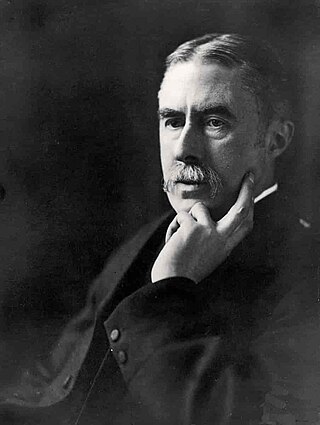
Alfred Edward Housman was an English classical scholar and poet. He showed early promise as a student at the University of Oxford, but he failed his final examination in literae humaniores and took employment as a patent examiner in London in 1882. In his spare time he engaged in textual criticism of classical Greek and Latin texts, and his publications as an independent researcher earned him a high academic reputation and appointment as professor of Latin at University College London in 1892. In 1911 he became the Kennedy Professor of Latin at the University of Cambridge. Today he is regarded as one of the foremost classicists of his age and one of the greatest classical scholars of any time. His editions of Juvenal, Manilius, and Lucan are still considered authoritative.
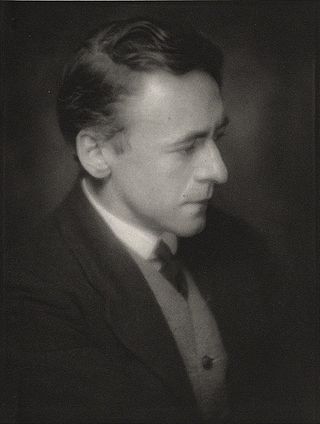
Sir Arnold Edward Trevor Bax was an English composer, poet, and author. His prolific output includes songs, choral music, chamber pieces, and solo piano works, but he is best known for his orchestral music. In addition to a series of symphonic poems, he wrote seven symphonies and was for a time widely regarded as the leading British symphonist.
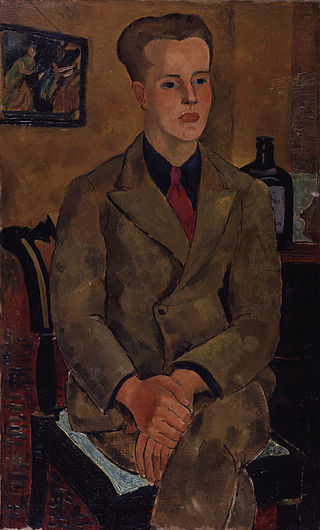
Leonard Constant Lambert was a British composer, conductor, and author. He was the founding music director of the Royal Ballet, and he was a major figure in the establishment of the English ballet as a significant artistic movement.
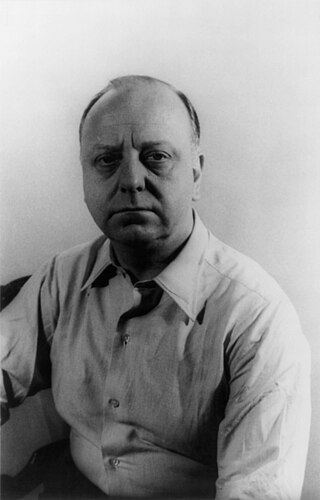
Virgil Thomson was an American composer and critic. He was instrumental in the development of the "American Sound" in classical music. He has been described as a modernist, a neoromantic, a neoclassicist, and a composer of "an Olympian blend of humanity and detachment" whose "expressive voice was always carefully muted" until his late opera Lord Byron which, in contrast to all his previous work, exhibited an emotional content that rises to "moments of real passion".

Ivor Bertie Gurney was an English poet and composer, particularly of songs. He was born and raised in Gloucester. He suffered from bipolar disorder through much of his life and spent his last 15 years in psychiatric hospitals. Critical evaluation of Gurney has been complicated by this, and also by the need to assess both his poetry and his music. Gurney himself thought of music as his true vocation: "The brighter visions brought music; the fainter verse".
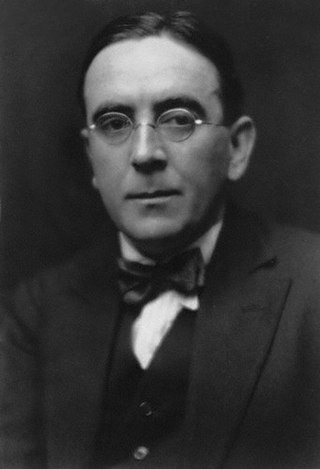
John Nicholson Ireland was an English composer and teacher of music. The majority of his output consists of piano miniatures and of songs with piano. His best-known works include the short instrumental or orchestral work "The Holy Boy", a setting of the poem "Sea-Fever" by John Masefield, a formerly much-played Piano Concerto, the hymn tune Love Unknown and the choral motet "Greater Love Hath No Man".

Ernest John Smeed Moeran was an English composer whose work was strongly influenced by English and Irish folk music of which he was an assiduous collector. His output includes orchestral pieces, concertos, chamber and keyboard works, and a number of choral and song cycles as well as individual songs.
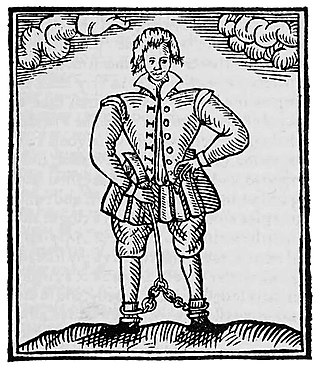
Thomas Nashe was an Elizabethan playwright, poet, satirist and a significant pamphleteer. He is known for his novel The Unfortunate Traveller, his pamphlets including Pierce Penniless, and his numerous defences of the Church of England.
A Shropshire Lad is a collection of 63 poems by the English poet Alfred Edward Housman, published in 1896. Selling slowly at first, it then rapidly grew in popularity, particularly among young readers. Composers began setting the poems to music less than ten years after their first appearance, and many parodists have satirised Housman's themes and poetic style.
Charles Wilfred Leslie Orr, generally known as C. W. Orr, was an English composer. He is particularly noted for his songs, though his output was small. He wrote only 35 songs in 82 years, 24 of them setting words by A. E. Housman.
The Tempest (Stormen), Op. 109, is incidental music to Shakespeare's The Tempest, by Jean Sibelius. He composed it mainly in the late summer 1925, his last major work before his tone poem Tapiola. Sibelius derived two suites from the score.
The Land of Lost Content is a song cycle for voice and piano composed in 1920–21 by John Ireland (1879–1962). It consists of settings of six poems by A. E. Housman from his 1896 collection A Shropshire Lad.
We'll to the Woods No More is a song cycle for voice and piano composed in 1928 by John Ireland. It consists of settings of two poems by A. E. Housman (1859–1936) and a concluding piece for solo piano named after a third.
Two Pieces for Piano is a work for piano solo composed in 1929–30 by John Ireland.
Three Pastels is a set of three pieces for piano solo composed in 1941 by John Ireland.
Decorations is a set of three pieces for piano solo composed in 1912–13 by John Ireland.

Graham Waterhouse, cellist and composer especially of chamber music, has written a number of song cycles. As a cellist, he has used string instruments or a Pierrot ensemble instead of the typical piano to accompany a singer. In 2003 he composed a first cycle of songs based on late poems by Friedrich Hölderlin. In 2016, he set nursery rhymes, excerpts from James Joyce, and texts by Shakespeare. In 2017, he wrote settings of poems by Irish female writers, and in 2022 a cycle of Buddhist texts for mezzo-soprano, cello and piano.
"Loveliest of trees, the cherry now" is a lyric poem by the English Latin scholar and poet A. E. Housman. Originally written in 1895, it was first published as the second poem in his collection A Shropshire Lad, where it appeared under the Roman numeral II, but without other title. It is usually referred to by its first line. Its theme, voiced by a young man contemplating cherry blossom, is the transitoriness of life and beauty, and the need to enjoy them while they last. It is probably Housman's best-known poem, and one of the most anthologized of English lyrics. Its opening line has become a part of the language, "inextricably lodged in the public mind and vocabulary". In a 1995 poll it was chosen as one of the British people's 100 favourite poems. It has been set to music over 60 times.








